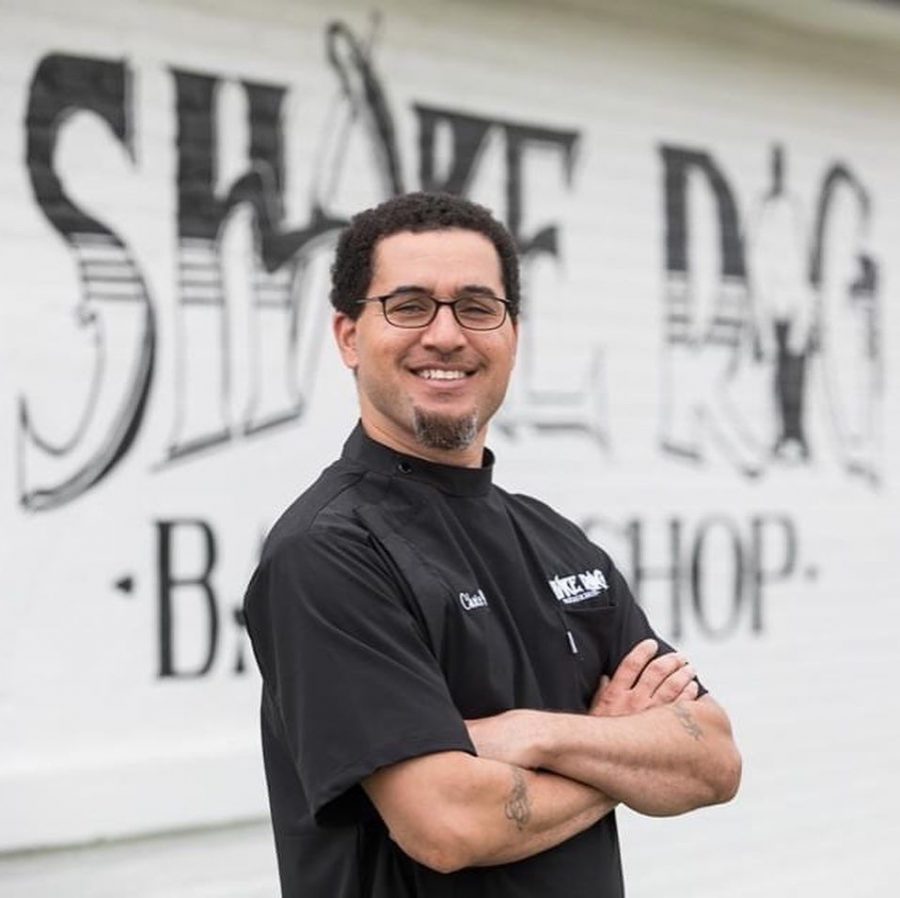Black businesses describe how the pandemic and racial frictions have affected them
June 23, 2020
When the novel coronavirus started spreading across the country, Chris Page had to shut down his Shake Rag Barbershop in Bowling Green for nine long weeks.
And when he could finally reopen, it coincided with a national outbreak of protests against racial injustice following the police killings of George Floyd in Minneapolis and Breonna Taylor in Louisville.
Along with those protests came a movement to support Black-owned businesses like Page’s — something that has helped him navigate the changing nature of his shop as he deals with strict regulations designed to prevent the spread of the COVID-19 virus.
“Now when people come in, there is no waiting room. You can’t just come hang out and chill, which takes away the spirit of the barbershop,” Page said. “There is nobody really in here besides the people getting their hair cut.”
While unemployment payments and a couple of federal programs helped him weather the pandemic storm, Page said the push to support Black-owned businesses, and outgrowth of the racial justice protests, has been positive.
He collaborated with artist Andee Rudloff to create a mural on the back of his barber shop dedicated to George Floyd. People have come down with chalk to sign their names to the wall, as well as a boutique block party to celebrate Juneteenth.
“The tension that we have dealt with historically from institutional inequality, we have to turn it on its head,” Page said, “We need to come together as African Americans and, if no one else shows us love, we will show each other love.”
Will Jones had a similar story.
Jones had hoped to keep his Gigi’s Cupcakes shop in Bowling Green open. But because the bakery in Buckhead Square depended on walk-ins for much of its business, the challenge proved to be overwhelming. Eventually, he had to close the store temporarily.
“We tried to keep our employees employed. The first thing we tried to do was try to reduce their hours. We tried to cut back on our store hours,” Jones said. “None of that came to work.”
But when Gigi’s reopened May 11, he found a little extra help. While also being recognized as a black owned business he said, the community has helped keep sales steady.
Support for small businesses, period, regardless of who they’re owned by, is crucial, Jones said, because those small businesses support the community.
“Small businesses are usually the ones giving contributions, making donations and helping others support their cause,” he said. “It’s important for people to understand where they spend their money and how important it is to spend that money locally.”
For Tierra and Jeremy Williams, who own a pair of small businesses, it’s all about community.
Tierra Williams, who owns T&J Childcare, said the pandemic forced her certified in-home daycare to close for three months at a time when her husband’s mentoring business, called Visionaries, was just launching.
Getting their businesses back on track has been helped by the movement to support Black-owned businesses, she said.
“We’ve had so much support from our neighbors,” Tierra Williams said. “I feel like my husband’s business has opened the door for him. His group is already based on young African Americans. Now he has the support that he needs.”
The support has been important to both their businesses, she said.
“I feel like just checking on us and just making sure we are okay, even simply asking how our day is enough. The little things go so far,” Tierra Williams said. “I feel like now is the time to support each other because we are all we have.”
The movement to have Black people spend their money at Black-owned businesses is aimed at not only promoting solidarity, but also strengthening the impact of that spending. The Black Star Project, based in Chicago, estimates that a dollar spent by a Black person circulates in the Black community for only six hours before leaving, a far shorter time than dollars spent by other ethnic groups within their own communities.
“The Black dollar doesn’t stay around long at all, compared to other communities,” Williams said.
She said successful Black-owned businesses are crucial to establishing an expectation of success. “I feel like they are important for the upcoming generation,” she said. “They are able to see for themselves from people who look like them.”
Page says the fact about the short circulation of a dollar in the Black community has been highlighted to make Black people feel guilty. “The truth of the matter is, African-Americans have been denied loans, opportunities to purchase land and things of that nature,” Page said. “It’s important for us to do the things that we do.”
He said people should be deliberate in their actions and their words.
“You need to put your money where your mouth is. If you want to buy Black, be intentional,” Page said. “Anything we do, we first try to reach out to African Americans, and if they are not in that category, then we will reach out to somebody else.
“Not only do we talk about being Black, we try to put our money where our mouth is.”















